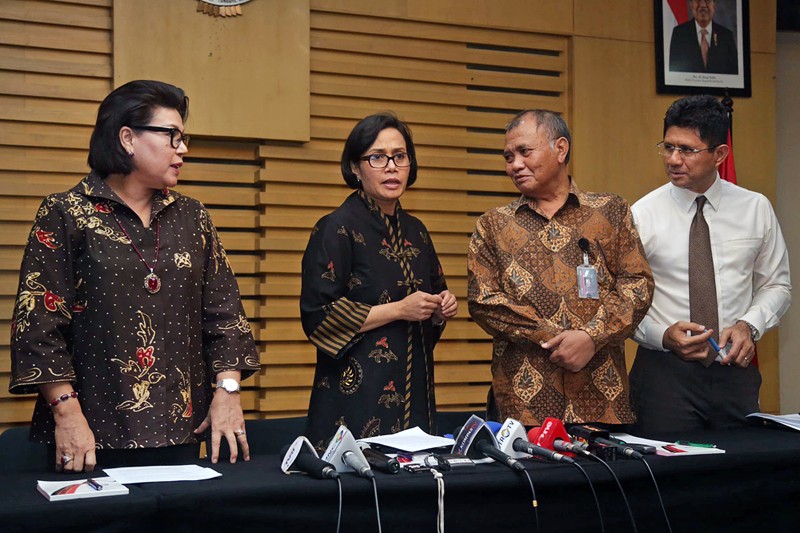Popular Reads
Top Results
Can't find what you're looking for?
View all search resultsPopular Reads
Top Results
Can't find what you're looking for?
View all search resultsGovt plays down global risks, relies on 2017 state budget
Change text size
Gift Premium Articles
to Anyone
 Good governance: Finance Minister Sri Mulyani Indrawati (second left) and Corruption Eradication Commission (KPK) chairman Agus Rahardjo (second right), accompanied by KPK deputies Basaria Panjaitan (left) and Laode M. Syarif (right), speak at a media conference at the KPK building in Jakarta recently. (JP/Wendra Ajistyatama)
Good governance: Finance Minister Sri Mulyani Indrawati (second left) and Corruption Eradication Commission (KPK) chairman Agus Rahardjo (second right), accompanied by KPK deputies Basaria Panjaitan (left) and Laode M. Syarif (right), speak at a media conference at the KPK building in Jakarta recently. (JP/Wendra Ajistyatama)
T
he government is playing down the effects of global economic turmoil on the economy, claiming that next year’s state budget is strong enough to weather volatility and will still spur growth.
Finance Minister Sri Mulyani Indrawati claimed that the 2017 state budget was designed as a fiscal tool to provide stimulus for resilient and sustainable economic growth that should be able to compensate for weakness in external demand.
Global economic conditions are projected to remain bleak next year as the world anticipates the upcoming US budget and the 2017 elections in France and Germany, which are the two biggest countries in the European Union and drivers of future recovery in the bloc.
China — the world’s second-biggest economy after the US and one of Indonesia’s main trading partners — is estimated to continue struggling and its growth is predicted to decline to 6.5 percent from around 6.6 percent to 6.7 percent currently.
“Downside risks remain large globally, so our economic growth should be sourced domestically as much as possible, so that impacts of global volatility won’t quickly seep into our economy,” she told reporters during a media gathering in Bogor, West Java, on Saturday.
Sri Mulyani argued that the 2017 budget was now more “credible” and “sustainable” than it was before, adding that revenue, spending and financing as the budget’s main components had been calculated with more precision.
Tax will still be the backbone of revenue and the government hopes to achieve Rp 1.49 quadrillion (US$109.8 billion) in next year’s tax revenue, a moderate 13 to 15 percent increase from expected tax revenue realization in 2016.
The government forecasts economic growth of 5.1 percent next year — a slight increase from the 5 percent forecast for 2016 — and expects infrastructure development in the regions will play a larger role.
As as much as Rp 387.3 trillionworth of funds have been set aside for infrastructure in the 2017 state budget and the State Budget Law itself stipulates that regions must allocate a minimum of 25 percent of their budget for infrastructure development.
Supported by government spending, companies are expected to start raising their demand for funding from the banking industry and capital market to support their expansion, Sri Mulyani said.
Private consumption, which accounts for over 55 percent of gross domestic product (GDP), will also be maintained as the government seeks to help preserve people’s purchasing power.
Finance Ministry’s Fiscal Policy Office (BKF) head Suahasil Nazara said the government was putting importance on economic reforms in anticipation of future incoming investment.
“When the time comes and they [investors] want to enter the emerging markets again, Indonesia will be different from the rest of its peers, like Brazil, India, Malaysia and Thailand.”
Separately, JPMorgan chief economist for emerging markets Jahangir Aziz said global trade was barely growing at 1 percent, which was a dramatic change from what it was in the period of 2005 to 2007, when global trade grew by around 4 to 5 percent in real terms.
The difficult situation has affected emerging markets, which then struggle to rebalance their economy away from dependence on exports to more domestic sources that have various requirements, such as infrastructure development and tax structure reforms.
“But, just for the near term, it is important to preserve the economy. Over the last few years, both India and Indonesia have demonstrated that they could safeguard macro stability,” he said.









